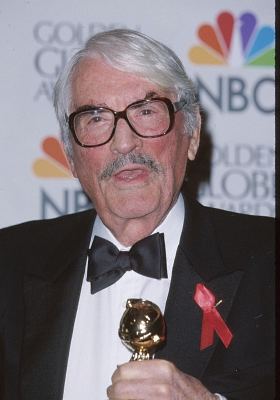|
Gregory Peck
Scroll down for movie list.
Spouse
'Veronique Passani' (31 December 1955 - present)
'Greta Rice' (1942 - 1955) (divorced)
------------------------------------------------------------------------
Biography from Leonard Maltin's Movie Encyclopedia:
Whether or not it's something he deliberately cultivated, Gregory Peck has attained in his screen persona an almost spiritual nobility, rooted in his earnest, sober portrayals of earnest, sober men. The quiet strength and dignity with which the tall, exceedingly handsome Peck invests many of his characters has made his occasional forays into villainy-and comedyall the more surprising, and effective.
Although he once planned on being a doctor, and even studied medicine at the University of California at Berkeley, Peck was lured to the stage as a young man, leaving his native California for an uncertain existence as an actor in New York. His 1942 Broadway debut, in "The Morning Star," was very well received, and after spending another year or so on stage he returned to California, this time to appear in RKO's Days of Glory (1944), playing a Russian partisan fighting the Nazis. But it was his next role, as a Roman Catholic priest in Keys of the Kingdom (also 1944) that really launched him to stardom, and earned him his first Academy Award nomination. High-profile parts followed: a mentally disturbed patient of psychiatrist Ingrid Bergman in Hitchcock's Spellbound (1945), an understanding father in The Yearling (1946, again nominated for an Oscar), and the lusty Lewt McCanles in David O. Selznick's Duel in the Sun (also 1946), a patently ridiculous, overheated Western.
After completing the excellent (and underrated) adaptation of Hemingway's The Macomber Affair Peck took on a daring role, that of the courageous reporter un covering anti-Semitism in Elia Kazan's Gentleman's Agreement (both 1947), snagging his third Oscar nomination for this multi-award-winning film. He played a lawyer in love with his dangerous client in The Paradine Case (1948, for Hitchcock), an Air Corps colonel on the verge of a crackup in Twelve O'Clock High (1949, earning yet another Oscar nod for this first-rate film), a weary, fatalistic hired killer in The Gunfighter (1950, one of his finest roles, and one for which he should have gotten Oscar recognition), the title role in Captain Horatio Hornblower the Hebrew monarch in David and Bathsheba (both 1951), a Hemingway protagonist in The Snows of Kilimanjaro (1952), a reporter in love in the charming Roman Holiday (1953), and a disaffected ad executive in the quintessentially 1950s drama of Madison Avenue angst, The Man in the Gray Flannel Suit (1956), among others.
Peck's robust performance as the tormented Captain Ahab in Moby Dick (1956) brought to the fore a quality previously hinted at in Spellbound and Twelve O'Clock High that of a strong-willed man driven to madness by internal demons. He went on to star in the delightful comedy Designing Woman (1957, opposite Lauren Bacall), The Big Country, The Bravados (both 1958), Pork Chop Hill (a pet project which he also produced), Beloved Infidel (as F. Scott Fitzgerald), On the Beach (all 1959), The Guns of Navarone (1961), and Cape Fear (1962), which he produced, and in which he allowed Robert Mitchum to take the flashier, more memorable part. That same year he produced and starred in the film for which he is most celebrated, To Kill a Mockingbird in which he plays a lawyer who defends a black man against a rape charge in the South. He won his only Oscar for his moving portrayal of Atticus Finch, the hero of Harper Lee's best-selling novel.
Peck's subsequent films include How the West Was Won (1962), Captain Newman, M.D (1963), Behold a Pale Horse (1964), Mirage (1965, a Hitchcockian thriller in which he plays an amnesiac), Arabesque (1966, an espionage drama teaming him with Sophia Loren), The Stalking Moon (1968), Mackenna's Gold, The Chairman, Marooned (all 1969), I Walk the Line (1970), Shootout (1971), Billy Two Hats (1974), The Omen (1976, a hit horror film), MacArthur (1977, in the title role as the famed general), The Boys From Brazil (1978, badly cast as Nazi scientist Josef Mengele in this silly thriller), and The Sea Wolves (1980).
Peck found little to attract him in the 1980s. However, having been described more than once as Lincolnesque, he finally got the chance to play the Great Emancipator in the TV miniseries "The Blue and the Gray" (1982). He took a supporting role as the president of the United States in the innocuous fable Amazing Grace and Chuck (1987), and then replaced an ailing Burt Lancaster in the plum role of curmudgeonly Ambrose Bierce, would-be romantic, in Old Gringo (1989); it was one of his best latter-day performances. He petitioned filmmaker Norman Jewison to cast him in the tailormade part of a principled factory owner in Other People's Money (1991, which was perhaps too tailor-made-too pat), and took an amusing cameo as a Southern lawyer in Martin Scorsese's remake of Cape Fear (1991). In 1993 he produced a made-for-TV adaptation of an offBroadway play that offered ideal parts for himself, Lauren Bacall, and daughter Cecilia Peck: The Portrait His son Tony Peck has also begun to carve a reputation for himself as a young leading man.
Very much an activist, Peck supports many charitable and political causes. He has been a chairman of the American Cancer Society and of the American Film Institute, and served as president of the Academy of Motion Picture Arts and Sciences from 1967 to 1970. In 1989 he received the AFI's Life Achievement Award. |  |










